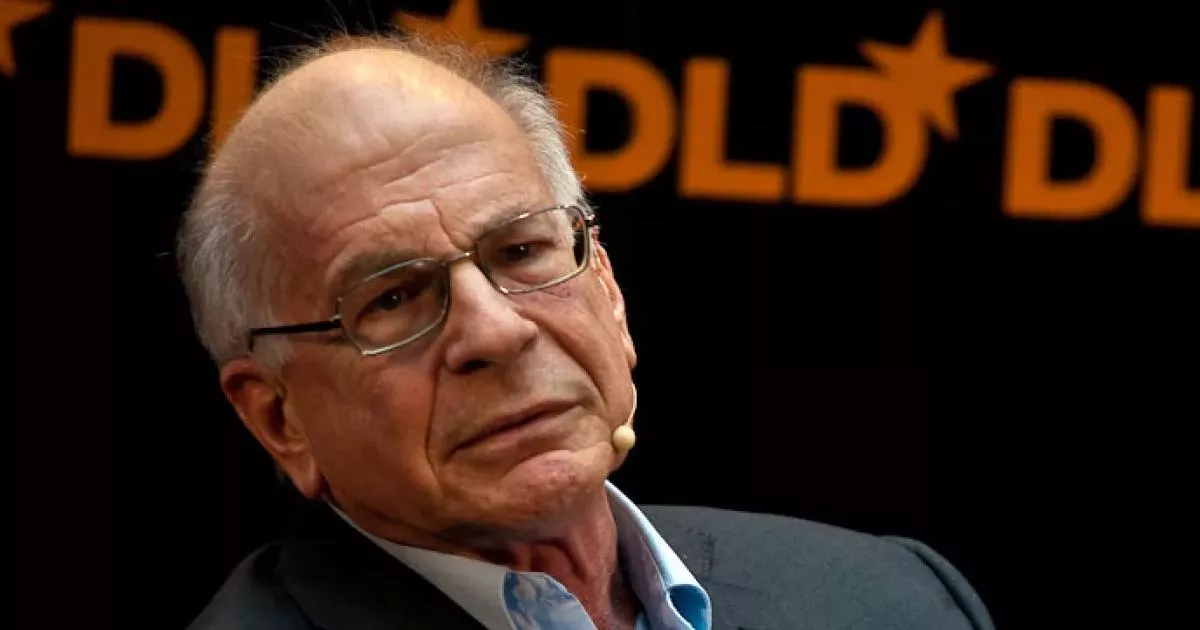Daniel Kahneman is a renowned Israeli-American author, psychologist, and economist known for his groundbreaking work in hedonism, the psychology of judgment and decision-making, and behavioral economics. His research, which challenged the traditional assumption of human rationality in economic theory, earned him the Nobel Memorial Prize in Economic Sciences in 2002, shared with Vernon L. Smith. Kahneman's empirical findings have significantly impacted modern economic thought, earning him the title of "grandfather of behavioral economics."
1940: Nazi Occupation of Paris
Kahneman and his family were in Paris when it was occupied by Nazi Germany in 1940. This period marked a significant challenge for the family as they navigated life under occupation.
1941: Encounter with an SS Soldier
In late 1941 or early 1942, during the Nazi occupation of Paris, a young Kahneman had a surprising and unsettling encounter with an SS soldier. Despite his fear, the soldier showed him kindness and gave him money.
1942: Encounter with an SS Soldier
In late 1941 or early 1942, during the Nazi occupation of Paris, a young Kahneman had a surprising and unsettling encounter with an SS soldier. Despite his fear, the soldier showed him kindness and gave him money.
1944: Passing of Kahneman's Father
Kahneman's father, Efrayim, unfortunately passed away in 1944 due to diabetes during a challenging time for the family while seeking refuge.
1954: Military Service in the Israeli Defense Forces
Kahneman began his military service in 1954 as a second lieutenant, serving in the infantry and later in the psychology department of the Israeli Defense Forces. He developed a structured interview for combat recruits that remained in use for decades.
1954: Graduation from Hebrew University of Jerusalem
Kahneman received his Bachelor of Science degree in psychology, with a minor in mathematics, from the Hebrew University of Jerusalem in 1954.
1958: Doctoral Studies at UC Berkeley
Kahneman moved to the United States in 1958 to pursue a Ph.D. in psychology at the University of California, Berkeley.
1961: Lecturer at Hebrew University of Jerusalem
Kahneman began his academic career in 1961 as a lecturer in psychology at the Hebrew University of Jerusalem. His early research was centered around visual perception and attention.
1961: Doctoral Dissertation
Kahneman completed his doctoral dissertation at UC Berkeley in 1961, focusing on the relationships between adjectives in the semantic differential. His work involved analyzing complex correlational structures and FORTRAN programming.
1965: Visiting Scientist at the University of Michigan
Kahneman took on the role of a visiting scientist at the University of Michigan from 1965 to 1966.
1966: Promotion to Senior Lecturer
Kahneman was promoted to senior lecturer at the Hebrew University of Jerusalem in 1966.
1967: Fellow at the Center for Cognitive Studies and Lecturer at Harvard University
During the academic year 1966-1967, Kahneman served as a fellow at the Center for Cognitive Studies and a lecturer in cognitive psychology at Harvard University.
1968: Meeting Amos Tversky
Kahneman and Tversky's paths first crossed in 1968 at the Hebrew University of Jerusalem's Psychology department, marking the beginning of their influential collaboration.
1968: Visiting Scientist at the Applied Psychology Research Unit in Cambridge
Kahneman spent the summers of 1968 and 1969 as a visiting scientist at the Applied Psychology Research Unit in Cambridge.
1969: Collaboration with Amos Tversky Begins
Daniel Kahneman's long-lasting and impactful collaboration with Amos Tversky started in 1969 after Tversky gave a guest lecture at one of Kahneman's seminars at Hebrew University.
1969: Visiting Scientist at the Applied Psychology Research Unit in Cambridge
Kahneman spent the summers of 1968 and 1969 as a visiting scientist at the Applied Psychology Research Unit in Cambridge.
1970: Teaching at Hebrew University
Kahneman's academic career included teaching at the Hebrew University in Jerusalem from 1970 to 1978.
1971: Collaboration on Judgment and Decision-Making
From 1971 to 1979, Kahneman and Tversky published groundbreaking work on judgment and decision-making, which later contributed to Kahneman winning the Nobel Prize.
1971: Publication of "Belief in the Law of Small Numbers"
In 1971, Kahneman and Tversky published their first co-authored paper titled "Belief in the Law of Small Numbers."
1975: Early Version of Prospect Theory Completed
An early version of prospect theory was completed by Kahneman and Tversky in early 1975, marking a milestone in their research on decision-making.
1977: Kahneman and Tversky at Stanford University
During the academic year 1977-1978, Kahneman and Tversky were both at Stanford University, where they befriended Richard Thaler, who would later become a prominent figure in behavioral economics.
1978: Move to University of British Columbia
In 1978, Kahneman left Hebrew University and became a professor at the University of British Columbia.
1978: Shift in Collaboration with Tversky
After 1978, their intense and exclusive collaboration decreased as they accepted positions at different universities, leading to a reduction in the frequency of their joint publications.
1978: Collaboration with Richard Thaler
Kahneman and Tversky continued their collaboration at Stanford in 1978, influencing Richard Thaler's thinking and contributing to the development of behavioral economics.
1978: Marriage to Anne Treisman
Kahneman married cognitive psychologist Anne Treisman in 1978. Their marriage lasted until her death in 2018.
1979: Focus Shift in Research
From 1979 to 1986, Kahneman published multiple articles and chapters.
1979: Publication of Prospect Theory
Kahneman and Tversky's final version of prospect theory, a significant contribution to behavioral economics, was published in 1979.
1980: Publication of "Toward a Positive Theory of Consumer Choice"
In 1980, Richard Thaler, influenced by Kahneman and Tversky, published "Toward a Positive Theory of Consumer Choice", a foundational text in behavioral economics.
1982: Publication of "Judgment Under Uncertainty: Heuristics and Biases"
In 1982, Kahneman and Tversky, along with Paul Slovic, edited "Judgment Under Uncertainty: Heuristics and Biases", a compilation summarizing their work and other recent advancements in the field.
1983: End of Exclusive Collaboration with Tversky
In 1983, Kahneman started publishing with other researchers, including his wife, Anne Treisman, marking a formal shift away from his exclusive collaboration with Tversky.
1984: Collaboration with Thaler and Knetsch
Richard Thaler spent the academic year 1984-1985 with Kahneman at the University of British Columbia, where they collaborated with Jack Knetsch on papers exploring fairness and the endowment effect.
1986: Continued Publications and Research Hiatus
Kahneman continued publishing until 1986. After a brief hiatus from 1987 to 1989, he shifted his research focus towards the study of subjective experience.
1986: Professor at University of California, Berkeley
Kahneman taught at the University of California, Berkeley from 1986 to 1994.
1994: Senior Scholar at Princeton University
From 1994 onwards, Kahneman became a senior scholar and faculty member emeritus at Princeton University's Department of Psychology and Princeton School of Public and International Affairs.
1996: Amos Tversky's Passing
Amos Tversky, Kahneman's close collaborator, passed away in 1996.
1998: Publication of "Does living in California make people happy?"
In 1998, Kahneman and Schkade published a paper exploring the "focusing illusion" in judgments of life satisfaction, using the example of perceived happiness differences between residents of California and the Midwest.
2000: Research on Happiness and Well-being
Around 2000, Kahneman led a team to develop a measure of experienced happiness, resulting in the Day-Reconstruction Method. He also contributed to the well-being module of the Gallup World Poll, furthering the understanding of happiness and life satisfaction.
2002: Nobel Memorial Prize in Economic Sciences
Daniel Kahneman was awarded the Nobel Memorial Prize in Economic Sciences in 2002 for his work in behavioral economics, particularly concerning human judgment and decision-making under uncertainty.
2011: Foreign Policy Top Global Thinker and Publication of "Thinking, Fast and Slow"
In 2011, Daniel Kahneman was named one of the top global thinkers by Foreign Policy magazine. That same year, his influential book "Thinking, Fast and Slow", summarizing his research, was published and became a bestseller.
2015: Personal Views and Traits
In 2015, Kahneman shared his political stance as being "far on the left of the spectrum in Israeli politics". He described himself as a hard-working, worrying, and not always jolly person, but capable of great enjoyment.
2015: Recognized as Influential Economist
In 2015, The Economist ranked Daniel Kahneman as the seventh most influential economist in the world.
2018: Death of Anne Treisman
Anne Treisman, Kahneman's second wife, passed away in 2018.
2018: Anne Treisman's Passing
Anne Treisman, Kahneman's wife and a cognitive psychologist and Royal Society Fellow, passed away in 2018.
2020: Relationship with Barbara Tversky
From 2020, Kahneman started living in New York City with Barbara Tversky, the widow of his longtime collaborator Amos Tversky.
2021: Publication of "Noise: A Flaw in Human Judgment"
Kahneman co-authored the book "Noise: A Flaw in Human Judgment" with Olivier Sibony and Cass Sunstein in 2021, further expanding on his work on human judgment and decision-making.
March 27, 2024: Daniel Kahneman passes away
Daniel Kahneman passed away on March 27, 2024.
Mentioned in this timeline
California is a U S state on the Pacific Coast...
Germany officially the Federal Republic of Germany is a Western...

Books are a means of storing information as text or...
Israel located in the Southern Levant region of West Asia...
Michigan is a peninsular state in the Great Lakes region...

War is defined as an armed conflict involving the organized...
Trending
1 month ago World Cup 2026 Draw: Brazil in Group C, France's Path
2 months ago India-Bangladesh Ties Strained as Hasina Faces Potential Execution; Extradition Unlikely.
2 months ago DHS immigration crackdown hits Charlotte, sparking protests and local confusion.

2 months ago Brooke Rollins' SNAP Benefits Criticism Sparks Controversy; Johnson Intervenes After 'Failed You' Comment.

3 months ago Marjorie Taylor Greene breaks with GOP on Obamacare, citing disgust over potential premium hikes.

8 months ago Derek Carr's Retirement Announcement and Injury Concerns in New Orleans Saints Saga
Popular

Stranger Things created by the Duffer Brothers is a popular...

XXXTentacion born Jahseh Dwayne Ricardo Onfroy was a controversial yet...

Kelsey Grammer is an accomplished American actor producer and singer...

Candace Owens is an American conservative political commentator and author...

Bernie Sanders is a prominent American politician currently serving as...

Melania Trump a Slovenian-American former model has served as First...
